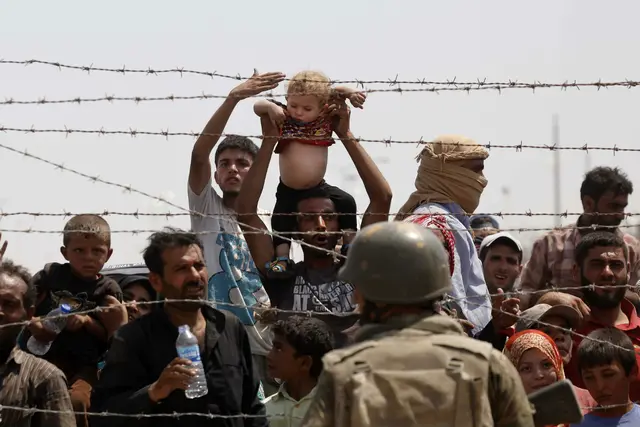Greece is making plans to accommodate refugees for longer periods, estimating the refugee crisis will last up to three years and with thousands of people stranded in the country, Greek migration minister Yannis Mouzalas said on Wednesday.
"I think we must consider the Idomeni crossing at the Greek- Former Yugoslav Republic of Macedonia (FYROM) border closed and we must prepare for the impact," he told a meeting of Greek mayors, according to Greek news agency AMNA.
The Greek official stressed Greece was turning from a transit country into a resettlement country and therefore more hospitality facilities for short and longer-term stays must be set up.
The Idomeni border crossing has been essentially sealed off over the past ten days as Austria and several Balkan states have introduced tighter limits on refugee crossings into their territories. Only a few dozen refugees per day are allowed to enter FYROM on their way to other central and northern European countries lately.
As a result, about 10,000 people who fled wars and poverty, made the perilous crossing from Turkey to Greece and reached Idomeni, have remained trapped along the border fence for many days, according to the Greek migration ministry. Nearly 30,000 are scattered across the country; from hot spots in the Aegean Sea islands, to Piraeus port facilities, to reception centers in Athens and northern Greece.
The situation in Idomeni is particularly dramatic, according to volunteers, and is growing worse each day, as more people are arriving to the makeshift tent city. The Greek state mechanism and NGOs are struggling to provide help after the sudden border shutdowns.
The camp that was established near the crossing over the past few months has a capacity of only about 1,500 people.
Most refugees are currently without shelter and facing food shortages.
Despite the grim situation, Mouzalas appeared confident on Wednesday that the problem was "manageable" and could improve once the stalled European relocation program that was agreed upon by European governments in 2015 starts running more smoothly.
Athens expects that the new EU emergency refugee aid scheme launched on Wednesday will also help improve the conditions for people in need.
Under the European Commission's proposal discussed in Brussels, an additional 700 million euros (760 million U.S. dollars) will be allocated over the next two years across EU member states to deal with humanitarian crises, including the refugee influx.
However, the key to reducing refugee flows through the Aegean into Europe is Turkey, Mouzalas said during Wednesday's meeting, as several Greek officials have repeatedly underscored in recent months, urging the EU to put more pressure on Ankara to cooperate to stem the flow of refugees and migrants.
In a positive signal that collaboration between the two sides is improving, Greece returned 267 migrants who were being held in detention centers for deportation to Turkey on Wednesday, as part of the re-admission protocol signed between the two countries a decade ago, according to AMNA.
The migrants who were re-admitted through the Evros border crossing in northern Greece were Moroccan, Algerian and Tunisian nationals, according to Greek authorities.
Another 41 were expected to be re-admitted to Turkey in coming hours, as well as 150 Pakistani nationals who had crossed from Turkey to Lesvos Island. Enditem
 简体中文
简体中文

